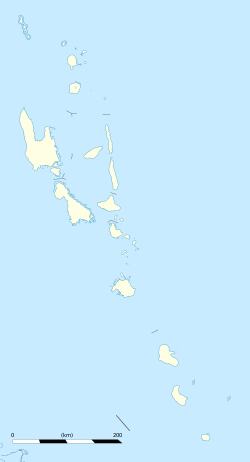This article needs additional citations for verification .(February 2022) |
Saratamata | |
|---|---|
Town | |
| Coordinates: 15°17′15″S167°59′25″E / 15.28750°S 167.99028°E | |
| Country | |
| Province | Penama Province |
| Island | Ambae Island |
| Elevation | 150 m (490 ft) |
| Time zone | UTC+11 (VUT) |
Saratamata is the capital of Penama Province of the island country of Vanuatu. [1] It is situated on the eastern shore of Ambae Island and is the largest settlement in that island.
